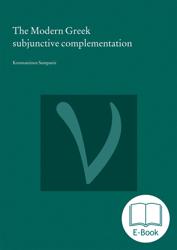This monograph addresses a syntactic “peculiarity” of the Modern Greek language, namely the phenomenon of finite complementation which is instantiated by the usage of a verbal category habitually described as the Modern Greek subjunctive mood. The study provides a systematic investigation of the Modern Greek subjunctive complementation through thorough examination of the diachrony, synchrony and typology of this construction and critically discusses existing theoretical analyses dealing with it.
This study explores one of the most salient features of the Modern Greek (MG) syntax, namely the complementation function of the na-clauses. Traditionally, this grammatical structure is seen as a mood category, a part of the verbal paradigm and is designated as a ‘subjunctive’. However, in spite of numerous publications dealing with the phenomenon, linguistic scholarship has not yet reached a consensus about the exact syntactic and semantic features of this grammatical construction. In this monograph it is suggested that the na-clauses do constitute a genuine mood category, nevertheless the impressionistic descriptiveness of traditional terminology should be supported by a more systematic and up-to-date semantic and syntactic analysis.
The book comprises eight chapters that offer a “holistic” approach to MG subjunctive complementation. To that end the na-clauses are examined by investigating extensive diachronic, synchronic, and typological data that shed light on this single phenomenon. Diachronically, the rise of the finite complementation in MG in Koinē and Early Middle Greek - and the parallel demise of the non-finite verbal categories - is discussed, synchronically the na-clauses are analyzed with regard to their semantic function and exact syntactic properties and typologically the MG na-clause are contrasted with several germane cross-linguistic complementation structures.
Despite the major importance of the subjunctive complementation within the MG syntax, this is the first monograph exclusively dedicated to this phenomenon. It aims to provide a precise description of the na-clauses which will be enduring and useful for any future attempt to better comprehend the overall complementation architecture of the Modern Greek language. In terms of methodology, it encompasses findings stemming from the long grammatic tradition on Greek philology, language contact research and state-of-the-art diachronic syntax.
This work is a slightly revised version of the author’s doctoral thesis which was awarded the Indo-European Society’s 2013 prize for best dissertation and will be of interest to historical linguists, syntacticians, typologists as well as classical philologists.
Konstantinos Sampanis was born in Athens in 1980. He studied Greek Philology and Linguistics at the University of Athens and he completed his doctoral studies at the University of Salzburg. He has worked as a lecturer and researcher at University of Salzburg, University of the Aegean and is currently a CoCirculation2 research program fellow at Boğaziçi University. His main research interests focus on historical linguistics, in particular syntactic change, the diachrony of the Greek language, language contact and sociolinguistics.


 Preface
Preface